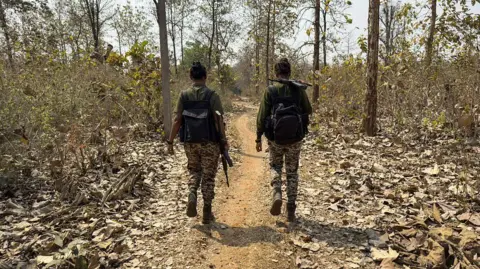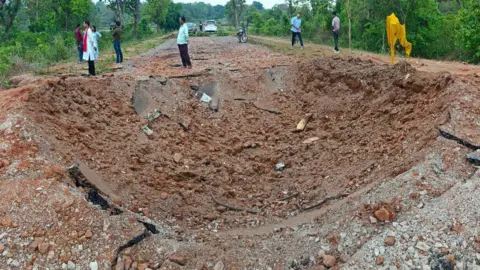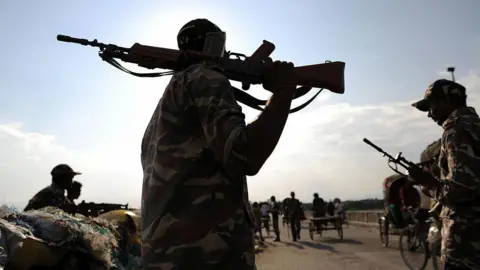
 AFP via Getty Images
AFP via Getty ImagesCould India’s decades-long jungle insurgency finally be approaching its end?
Last week, the country’s most-wanted Maoist, Nambala Keshava Rao – popularly known as Basavaraju – was killed along with 26 others in a major security operation in the central state of Chhattisgarh. Home Minister Amit Shah called it “the most decisive strike” against the insurgency in three decades. One police officer also died in the encounter.
Basavaraju’s death marks more than a tactical victory – it signals a breach in the Maoists’ last line of defence in Bastar, the forested heartland where the group carved out its fiercest stronghold since the 1980s.
Maoists, also known as “Naxalites” after the 1967 uprising in Naxalbari village in West Bengal, have regrouped over the decades to carve out a “red corridor” across central and eastern India – stretching from Jharkhand in the east to Maharashtra in the west and spanning more than a third of the country’s districts. Former prime minister Manmohan Singh had described the insurgency as India’s “greatest internal security threat”.
The armed struggle for Communist rule has claimed nearly 12,000 lives since 2000, according to the South Asian Terrorism Portal. The rebels say they fight for the rights of indigenous tribes and the rural poor, citing decades of state neglect and land dispossession.
The Maoist movement – officially known as Left-Wing Extremism (LWE) – took formal shape in 2004 with the merger of key Marxist-Leninist groups into the CPI (Maoist). This party traces its ideological roots to a 1946 peasant uprising in the southern state of Telangana.

 AFP via Getty Images
AFP via Getty ImagesNow, with Prime Minister Narendra Modi’s government pledging to end Maoism by March 2026, the battle-hardened rebellion stands at a crossroads: could this truly be the end – or just another pause in its long, bloody arc?
“There will be a lull. But Marxist-Leninist movements have transcended such challenges when the top leadership of the Naxalites were killed in the 70s and yet we are talking about Naxalism,” said N Venugopal, a journalist, social scientist and long-time observer of the movement, who is both a critic and sympathiser of the Maoists.
One of the senior-most officials in India’s home ministry who oversaw anti-Maoist operations, MA Ganapathy, holds a different view.
“At its core, the Maoist movement was an ideological struggle – but that ideology has lost traction, especially among the younger generation. Educated youth aren’t interested anymore,” says Mr Ganapathy.
“With Basavaraju neutralised, morale is low. They’re on their last leg.”
The federal home ministry’s latest report notes a 48% drop in violent incidents in Maoist-related violence – from 1,136 in 2013 to 594 in 2023 – and a 65% decline in related deaths, from 397 to 138.
However, it acknowledges a slight rise in security force casualties in 2023 compared to 2022, attributed to intensified operations in core Maoist areas.
The report says Chhattisgarh remained the worst-affected state in 2023, accounting for 63% of all Left-Wing Extremism (LWE) incidents and 66% of the related deaths.
Jharkhand followed, with 27% of the violence and 23% of the deaths. The remaining incidents were reported from Maharashtra, Odisha, Madhya Pradesh and Bihar.

 AFP via Getty Images
AFP via Getty ImagesThe collapse of Maoism in Chhattisgarh, a stronghold of the insurgency, offers key clues to the movement’s broader decline.
A decade ago, the state’s police were seen as weak, according to Mr Ganapathy.
“Today, precise state-led strikes, backed by central paramilitary forces, have changed the game. While paramilitary held the ground, state forces gathered intelligence and launched targeted operations. It was clear role delineation and coordination,” he said.
Mr Ganapathy adds that access to mobile phones, social media, roads and connectivity have made people more aware and less inclined to support an armed underground movement.
“People have become aspirational, mobile phones and social media have become widespread and people are exposed to the outside world. Maoists also cannot operate in hiding in remote jungles while being out of sync with new social realities.
“Without mass support, no insurgency can survive,” he says.
A former Maoist sympathiser, who did not want to be named, pointed to a deeper flaw behind the movement’s collapse: a political disconnect.
“They delivered real change – social justice in Telangana, uniting tribespeople in Chhattisgarh – but failed to forge it into a cohesive political force,” he said.
At the heart of the failure, he argued, was a dated revolutionary vision: building isolated “liberated zones” beyond the state’s reach and “a theory to strike the state through a protracted people’s war”.
“These pockets work only until the state pushes back. Then the zones collapse, and thousands die. It’s time to ask – can a revolution really be led from cut-off forestlands in today’s India?”
The CPI (Maoist)’s 2007 political document clings to a Mao-era strategy: of creating a “liberated zone” and “encircling the cities from the countryside.” But the sympathiser was blunt: “That doesn’t work anymore.”

 AFP via Getty Images
AFP via Getty ImagesThe party still retains some popular support in a few isolated pockets, primarily in the tribal regions of eastern Maharashtra, southern Chhattisgarh and parts of Odisha and Jharkhand – but without a strong military base.
Ongoing operations by state forces have significantly weakened the Maoist military infrastructure in their strongholds in southern Chhattisgarh. Cadres and leaders are now being killed regularly, reflecting the rebels’ growing inability to defend themselves.
Mr Venugopal believes the strategy needs rethinking – not abandonment.
The underground struggle has its place, he said, but “the real challenge is blending it with electoral politics”.
In contrast, Mr Ganapathy sees little hope for the Maoists to mount a meaningful fightback in the near future and argues that the time has come for a different approach – dialogue.
“It would be wise for them to go for talks now and perhaps unconditionally or even lay down the conditions and let the government consider them. This is the time to approach the government instead of unnecessarily sacrificing their own cadres, without a purpose,” he said.
Maoists enjoy support in Andhra Pradesh and Telangana from mainstream political parties. In Telangana, both the ruling Congress and the main opposition Bharat Rashtra Samithi (BRS) have backed calls for a ceasefire, along with 10 smaller Left parties – an effort widely seen as aimed at protecting the group’s remaining leaders and cadres.
The Maoist movement, rooted in past struggles against caste oppression, still carries social legitimacy in parts of these states. Civil society activists have also joined the push for a truce.
“We, along with other civil rights groups, demanded a two-step process – an immediate ceasefire followed by peace talks,” said Ranjit Sur, general secretary of the Kolkata-based group Association for Protection of Democratic Rights.
Maoist-affected states remain resilient strongholds in part because they are rich in minerals – making them sites of intense resource battles. Mr Venugopal believes this is key to the CPI (Maoist’s) enduring presence.
Chhattisgarh, for instance, is India’s sole producer of tin concentrates and moulding sand, and a leading source of coal, dolomite, bauxite and high-grade iron ore, according to the ministry of mines.
It accounts for 36% of the country’s tin, 20% iron ore, 18% coal, 11% dolomite and 4% of diamond and marble reserves. Yet, despite strong interest, mining companies – both global and national – have long struggled to access these resources.
“Multinational companies couldn’t enter because the Maoist movement, built on the slogan ‘Jal, Jangal, Jameen (Water, Forest, Land),’ asserted that forests belong to tribespeople – not corporations,” Mr Venugopal said.
But with the Maoists now weakened, at least four Chhattisgarh mines are set to go to “preferred bidders” after successful auctions in May, according to an official notification.
Mr Venugopal believes that the resistance won’t die with the death of Maoist leaders.
“Leaders may fall, but the anger remains. Wherever injustice exists, there will be movements. We may not call them Maoism anymore – but they’ll be there.”



















